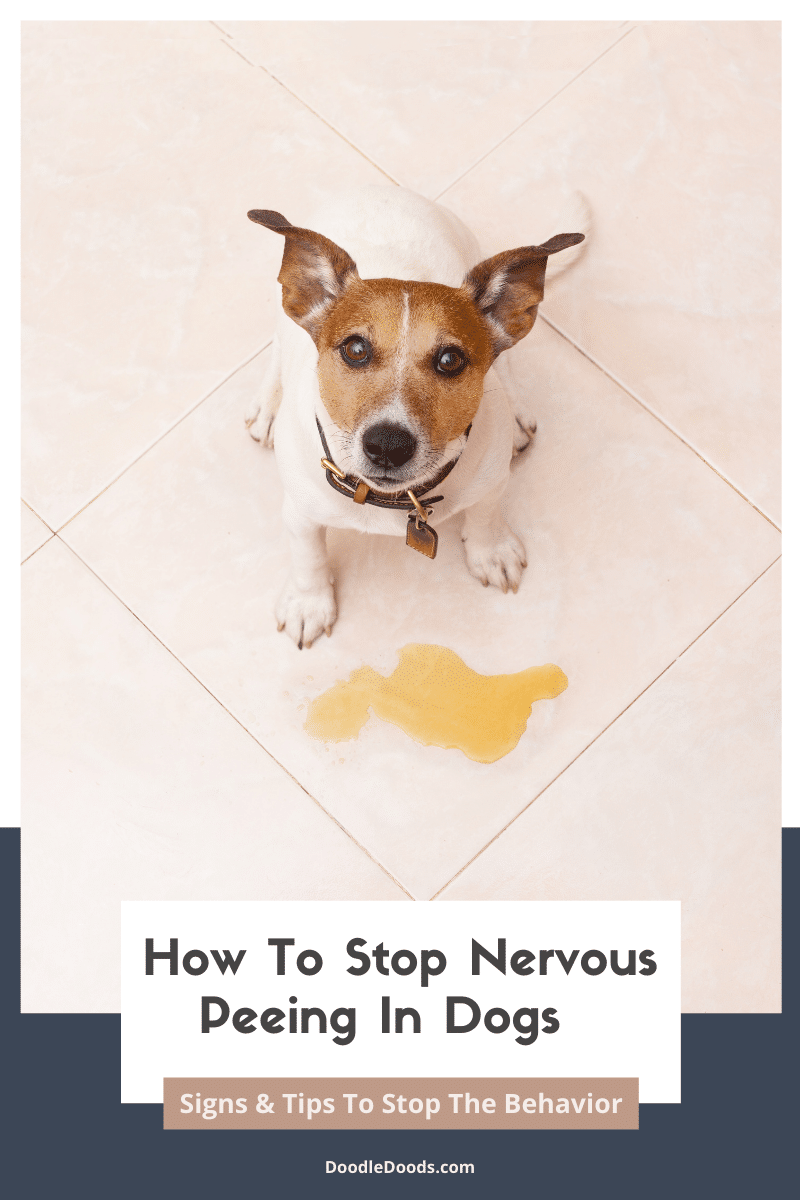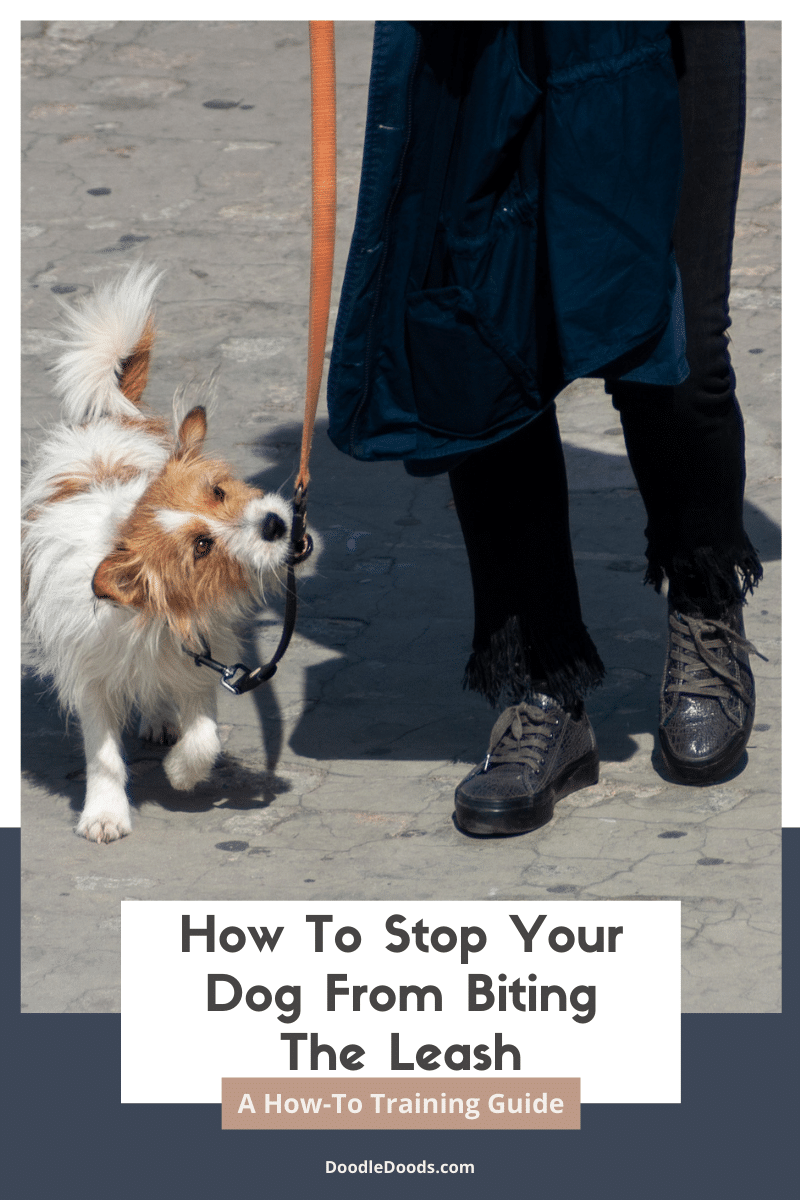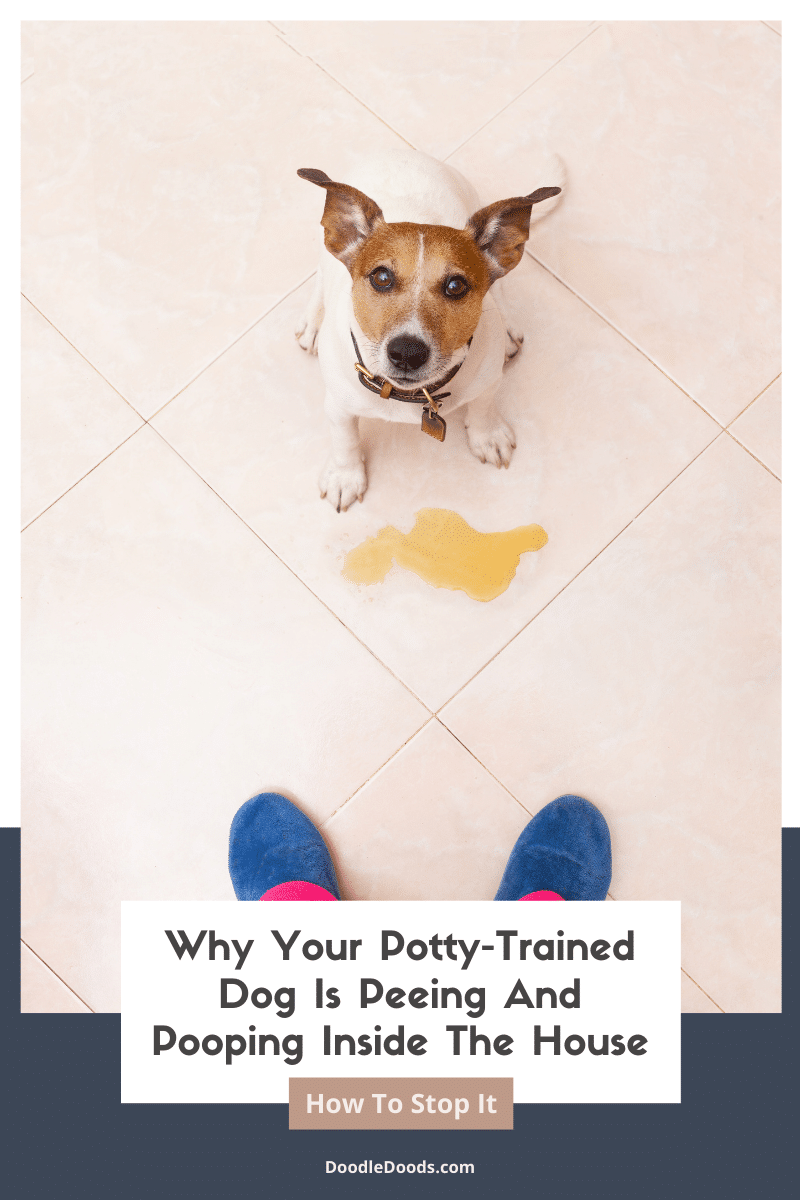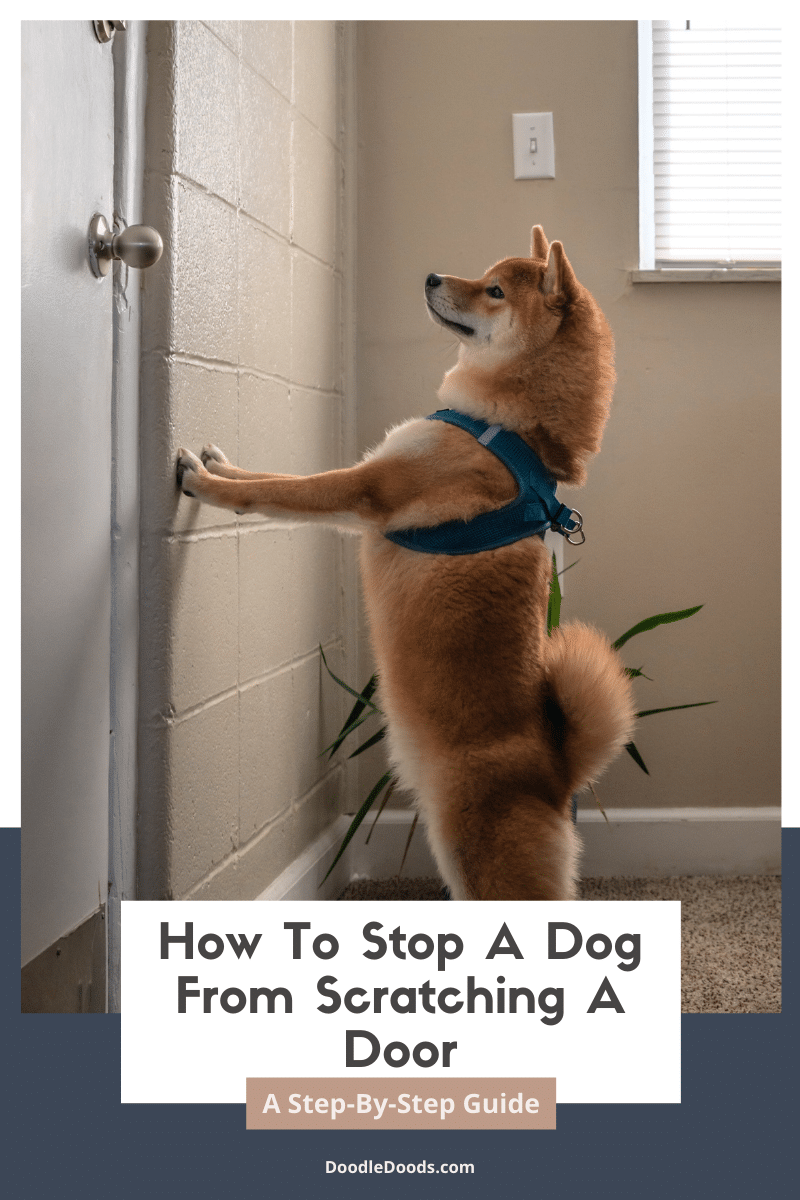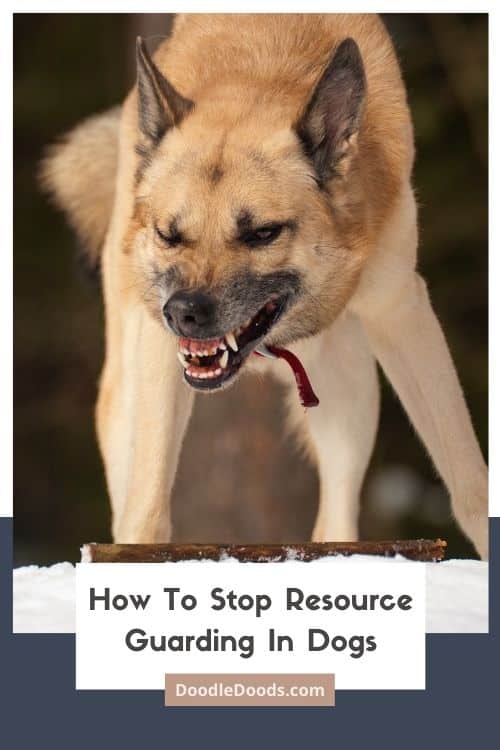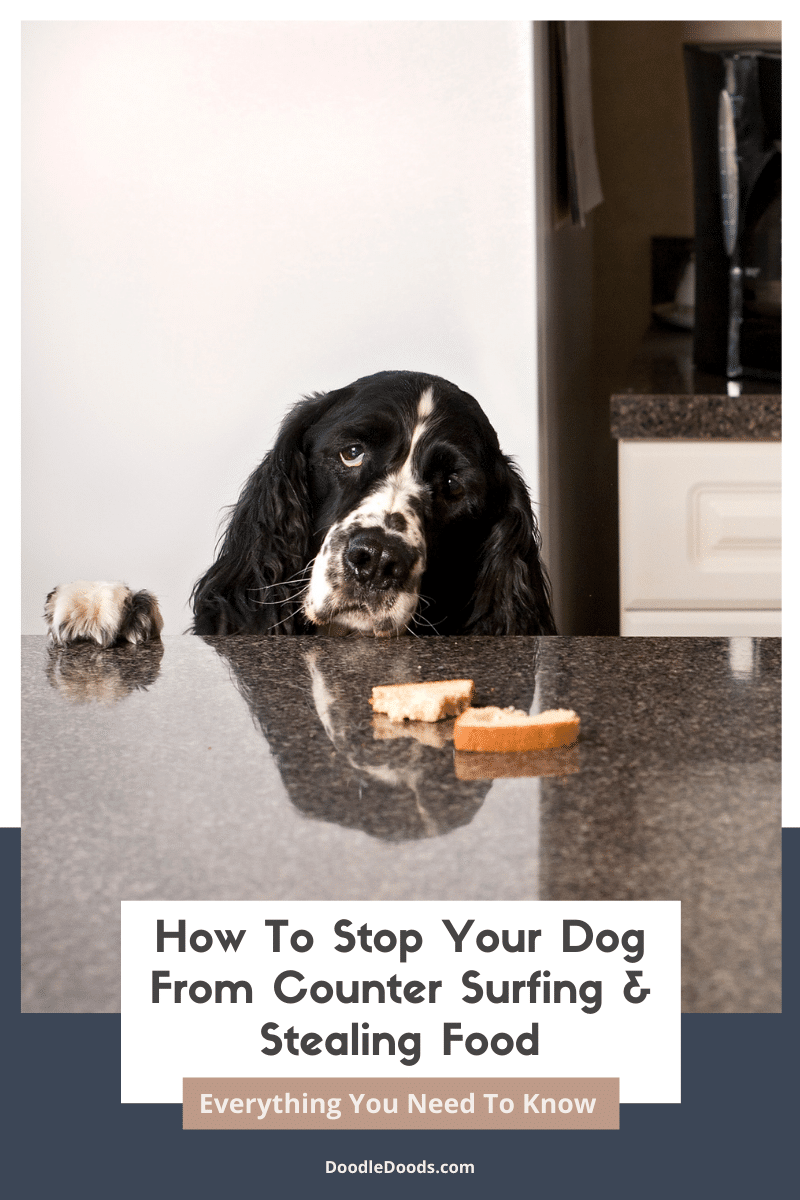If you’ve got your hands full with a precious dog that tends to pee when nervous, then don’t worry. There’s always a solution to a problem! In this guide, we’re going to discuss some of the most common reasons for nervous peeing in dogs and how you can tackle this issue so that your pup leaves no puddles behind when they’re happy, excited, or feeling shy. Keep on reading to learn more!
Table of Contents
- Nervous Peeing In Dogs: Introduction
- Why Do Dogs Pee When Nervous?
- What Are The Signs Of Nervous Peeing In Dogs?
- How To Stop Dogs From Peeing When Excited Or Nervous?
- Nervous Peeing In Dogs: FAQs
Nervous Peeing In Dogs: Introduction
Like us humans, dogs feel a wide range of emotions depending on the situation. Whenever you walk through the front door, your four-legged best pal is already there greeting you, so happy and excited that they simply cannot contain themselves. Sometimes, this excitement also triggers your dog to pee as well, making you wonder – why is this happening?
Nervous peeing in dogs is nothing new. It’s also not uncommon for puppies and dogs to accidentally pee when they get overly excited, happy, or even feeling shy or scared. All of these emotions can trigger that undesired peeing action indoors. In other words, if your dog gets overly stimulated, they may accidentally let loose that pee you don’t want to see on your floors by any means.
If you’re lucky, your pup might accidentally relieve themselves onto the kitchen or bathroom tiles, or at least hardwood floors. But you might also be one of those dog owners who struggle with those smelly little puddles on their carpets or soft furniture. It’s that much harder to clean up, that’s for sure!
Now, this doesn’t necessarily mean that your dog is having difficulty with house training. They might know exactly when it’s time to potty and where they can do it. However, in those small moments of excitement or nervousness, it’s almost as an uncontrollable reflex of their body.
Of course, there may also be other causes for inappropriate peeing in dogs. But in this guide, we’re going to focus on nervous peeing in dogs, either due to excitement or submission, and the emotions behind this behavior.
Why Do Dogs Pee When Nervous?
As we discussed, a dog might pee when scared, nervous, or even excited. Basically, if your dog gets overly stimulated, in a more heightened emotional state, it could trigger inappropriate peeing.
Nervous peeing in dogs is usually most common in puppyhood. More often than not, dogs actually grow out of this behavior once they become more confident and overall mature and calm down. It’s also worth noting that nervous peeing in dogs is more common in females than males.
Needless to say, the emotional state of a dog is very different when they’re overly excited or happy to see you, or when they’re feeling scared, shy, or nervous. Some dogs might also accidentally pee when they’re startled.
By the way, we asked our newsletter subscribers if their Doods nervous pee and here are the results:
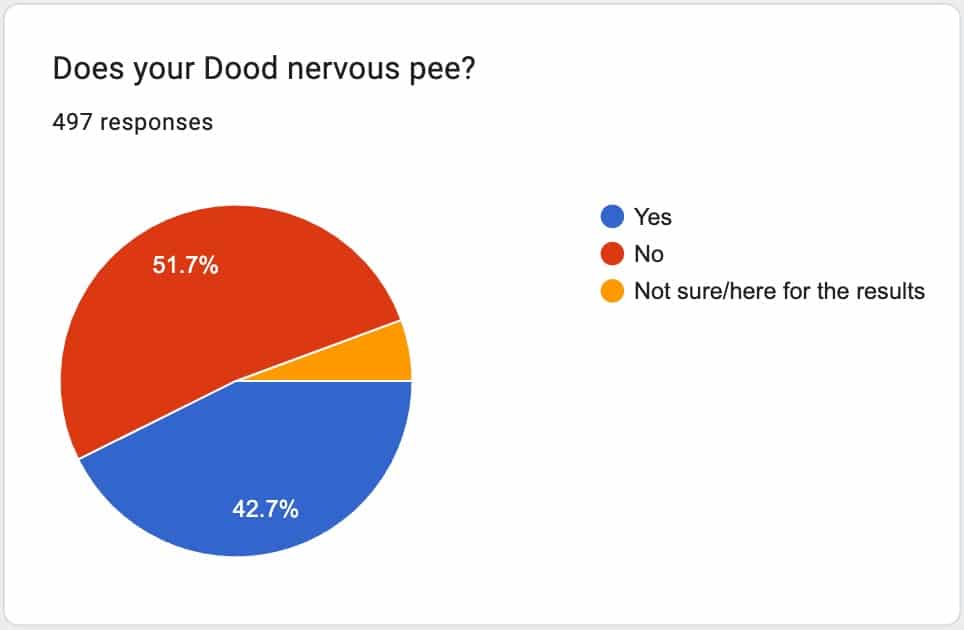
Excitement Urination In Dogs: Dog Pees When Excited Or Happy
The more positive type of nervous peeing is due to excitement and happiness. If your dog pees when excited, it can understandably bring forth mixed emotions. On one hand, they seem so happy to see you. On the other hand, why are they peeing then?!
Oftentimes, puppies are more prone to peeing when excited than adult dogs. That’s partly due to the fact that puppies have poor bladder control. After all, they’re still learning. But sometimes this behavior can also carry on into adulthood.
Excitement urination tends to happen when a dog is in an overstimulated headspace and environment. For instance, if your pup tends to pee when greeting you, you might want to pay attention to your own behavior and body language too. Are you making loud noises or jumping up and down alongside your pup? Although there’s no shame in being happy about seeing your pet, it can make young dogs a bit too stimulated.
Sometimes a dog might also pee when super excited during playtime. You can imagine how happy they are to chase that ball! And if you’ve got a particularly outgoing pup, they may also pee out of excitement when meeting new people or other pets.
Submissive Urination In Dogs: Dog Pees When Scared
Then there’s also the more negative type of nervous peeing in dogs, a.k.a submissive urination. As the name hints, submissive urination usually happens when a dog is scared, anxious, or feeling shy. Basically, whenever they feel threatened – even if there’s no actual threat to them. This can happen whenever someone new approaches them, stands above them, or uses a loud voice or a more aggressive body language. Even hearing loud noises can trigger submissive urination.
By the way, submissive urination is more common in adult dogs than excitement urination. Submissive urination is a common problem in shy and timid dogs, and especially in dogs that have been abused or traumatized in the past. For example, if a dog has been punished in the past.
Sometimes those negative emotions may also stem from separation anxiety. Some dogs are more prone to separation anxiety and simply have a hard time being away from their beloved owners. And in those emotionally taxing situations they might accidentally urinate. Likewise, dogs suffering from separation anxiety may also get a bit too excited when their owners come back home, leading them to pee out of excitement.
If you’ve noticed that your otherwise house trained pup can’t seem to control their bladder in certain situations, you’ve first got to figure out what’s the root cause. Whether it’s due to excitement, fear, or shyness, knowing exactly what causes it will help you tackle the problem.
What Are The Signs Of Nervous Peeing In Dogs?
Whether you’re confused if your dog is struggling with its house training or they actually pee out of excitement or submission, there are a few ways to figure it out.
If your dog pees when excited, you’ll also notice the other obvious signs – they seem overjoyed (most commonly during greetings or playtime), jumping up and down, wagging their tail, or barking. Usually, they pee when standing, without lifting their leg or sitting down.
In case of submissive urination, you’ll likely notice your pooch showing other signs of submission as well. These include symptoms like cowering, pushing their ears back, tucking their tail between their legs, avoiding eye contact with you, tucking their legs, and overall giving a more timid body language.
Interestingly enough, when a dog pees when excited or nervous, they probably don’t even understand that they’re relieving themselves. Sometimes they leave a puddle of pee behind them, other times they may just pee a small amount.
Also, it’s just as important to analyze what happened before your pooch relieved themselves. Were they startled by someone or something? Did they seem excited and happy that you arrived home? Or perhaps there was someone towards the dog that they felt fearful of? Even new environments and situations can trigger anxiety and fear in some pups, resulting in submissive urination.
How To Stop Dogs From Peeing When Excited Or Nervous?
Check For Health Problems
First things first, if your dog pees when excited or nervous, make sure to rule out any underlying health conditions. Getting your pup checked by a licensed veterinarian is a surefire way to get to the bottom of it and catch any worrying conditions early on before they can do more damage to your pet’s health.
For instance, bladder infections, urinary tract infections, bladder stones, and even incontinence can all be to blame for the improper urination. Additionally, diabetes and kidney disease often lead to excessive urination due to increased thirst. What’s more, even changes in your dog’s diet or drinking habits can trigger undesired peeing indoors.
Do Not Appear Dominant
If you’ve got a more timid or shy pup, you should avoid being too dominant around them. It goes without saying that any type of negative body language or talk is a no-go. When dealing with nervous peeing in dogs, your goal should be to build your dog’s confidence without making them more fearful in certain situations. The only way to do it is with positive reinforcement with plenty of praise and treats.
So, if your dog isn’t behaving as you’ve expected them to, never scold or punish them. If you’re about to pet your dog, approach from the sides or under the chin, instead of petting them directly onto the head. Don’t make loud noises and try to keep both the environment and yourself as calm as possible.
Change How You Approach Your Dog
Whether you’ve got a dog who pees when excited or when nervous, approaching your dog the right way can make a world of difference.
If you’ve got a dog who pees when excited, try to avoid making those situations overstimulating for your pup. As this most often happens during greetings, it’s best to keep them low key. Don’t make a big fuss out of those moments when you see your pup again. The more excited you get, the more excited your dog will get, too. So, no loud or high-pitched noises or overly excited body language. The same goes for anyone else in your family or who meets your dog, so make sure that everyone understands how to approach the dog.
In case of submissive urination, it’s also important to be mindful of how you approach your pooch. For example, you can get down on your knees to their level to appear less dominant. Likewise, don’t look your pooch directly into their eyes, as this can make them feel more fearful. Again, make sure that anyone who encounters your pet understands how to approach them properly so that they won’t trigger any anxiety or fear in your pup.
Clean Up Potty Accidents Immediately
Regardless if your pup leaves a few drops or a whole puddle of pee behind them, make sure to immediately clean it up with proper odor-eliminating or enzymatic cleaning products to get any of that urine smell out.
This is a great hack to prevent your dog from going potty in the same spot later. Since dogs have extremely sensitive noses, it’s not uncommon for them to start going to the bathroom in those same spots if they haven’t been properly cleaned previously. For puppies that aren’t fully house trained yet, this could become an issue quite quickly!
Take Your Dog Out For A Walk
As we learned, excited and nervous peeing in dogs is most common in puppyhood. If you’ve got a young pup that seems to get overstimulated just about everything, a simple trick would be to take them out for walks and potty breaks more often.
Not only will this provide your puppy a chance to relieve themselves, it’s also a great way to tone down some of that excess excitement and get them more relaxed before heading back home. In fact, you can even take your pup outside as soon as you notice them getting too excited indoors.
Keep in mind that very young puppies don’t have good control over their bladders and it can take months before they’re fully house trained. By taking them out for bathroom breaks, you’re already reducing the chance of them peeing indoors when playing or greeting you.
Also, you might want to consider having all of your pup’s playtimes outdoors as well until they’ve stopped urinating indoors when excited. This makes for less clean up for you, and more fun time outdoors for your puppy!
Teach Basic Dog Commands
For dogs that pee when excited, it’s important to teach them proper greeting behaviors with the help of commands. For instance, a helpful trick is to tell your dog to “sit” whenever greeting you or new people. Once your dog has obeyed the command, sat, and calmed down, you can go ahead and give them a pet or hug. Also, be sure to reward your pooch with praise and treats for behaving appropriately. Again, don’t scold or punish your pup when they’re struggling with this at first!
As we’re on the topic of teaching your dog appropriate behaviors and commands, we also recommend that you set a daily schedule for your pup. If your dog knows what to expect when they wake up, such as when it’s time to go potty and when it’s time for play, it’s much easier to tackle any undesired behaviors. This will also build your dog’s confidence and prevent submissive urination.
Eliminate The Triggers
In some cases, submissive urination is triggered by a specific thing, sound, environment, or a person that your dog is scared of. Many dogs are afraid of fireworks, which can understandably trigger submissive urination. If that’s the case, try to keep your dog away from windows and place them in a safe and calm environment in the meantime. Or, you might have a certain home appliance that always scares your dog – make sure to safely confine your pet away from the appliance whenever it’s working.
Socialize Your Puppy
Early socialization is vital for any puppy to learn how to properly interact with anyone they meet. But not just that! It’s also a great confidence building exercise for your best pal so that they won’t become fearful or shy in new situations or when meeting new people.
Whether your dog is struggling with submissive urination or peeing when excited, safely introducing them to people of all ages, shapes, and sizes is a great way to help them get used to new people. Likewise, make sure to socialize your pet with other dogs and cats as well to prevent any fearful reactions.
Hire A Professional Trainer
Sometimes, getting rid of excitement or submissive urination in dogs requires a bit more technical approach. If you’re feeling stuck in this process, don’t hesitate to reach out to a professional dog trainer or a dog behaviorist to help your dog gain the confidence they need or tone down some of that excess excitement.
We also recommend you check out the Online Puppy School by Baxter & Bella that has many helpful resources on this topic. Plus, it’s truly one of the best programs on the market that teaches you how to successfully raise your pup into a well-behaved, well-rounded, and confident dog.
Nervous Peeing In Dogs: FAQs
If you’ve got a nervous peeing dog, you’ve first got to figure out what’s triggering this behavior. Before anything else, have them checked by their vet to rule out any underlying health conditions. Of course, never punish or scold your dog for peeing indoors and only use positive reinforcement training methods. In case of submissive urination, avoid being too dominant around your dog and approach them with a calm presence without making them scared or startled. You can also take your dog for more frequent potty breaks outside to minimize the issue.
Indeed, it’s not uncommon for puppies to pee when happy or excited. Fortunately, they also tend to grow out of this behavior once they get older. This usually happens once your dog learns how to control their bladder better. We also recommend you keep any of those overstimulating situations more low key, such as greetings and playtime, to prevent them from peeing inside.
Submissive urination usually stops around the time a puppy reaches adulthood, so roughly at around their first birthday. Of course, you’ve also got to do your part to ensure that you’re not triggering any fear or anxiety in your pup. As submissive urination is most common in puppies under a year old and female puppies in general, that’s also something to keep in mind.
Nervous Peeing In Dogs: Final Thoughts
It’s safe to say that probably none of us dog owners enjoy having to deal with constant pee accidents around the house. However, if you have a dog who pees when they’re either nervous, excited, happy, or fearful, there’s no other way than to deal with the problem. In many cases, nervous peeing in dogs is something that happens in puppyhood and often starts to phase out once they reach adulthood. Other times, this unfortunate behavior carries onto their adult years.
Either way, with the right approach and some simple tricks, you can successfully put an end to your dog’s inappropriate peeing habits. We hope you learned some helpful information about nervous peeing in dogs from this guide so that you can help your pooch fully thrive and live a happy life with healthy levels of excitement.
Learn How to Care for Your Doodle Puppy!

Perfect for first-time Doodle parents, get ALL your questions answered, including questions new Doodle parents don’t even think to ask.
Plus, get $700 worth of Bonus Materials for FREE, including:- Doodle Parenthood Community and Support Group ($190 value)
- Doodle Puppy Growth Tracker ($20 value)
- EMERGENCY Cheatsheet: When To Call The Vet Immediately ($50 value)
- HELP! Button ($145 value)
- And SO MUCH MORE!

